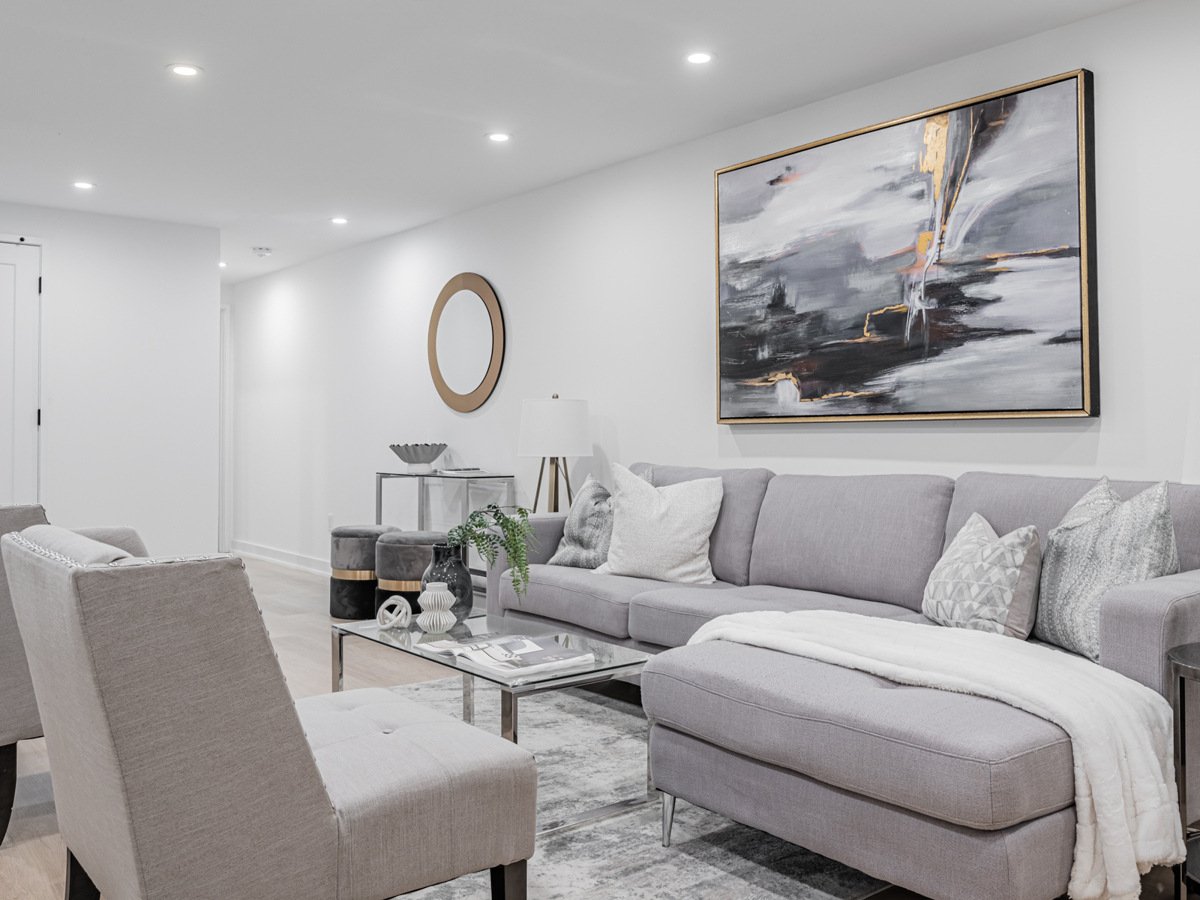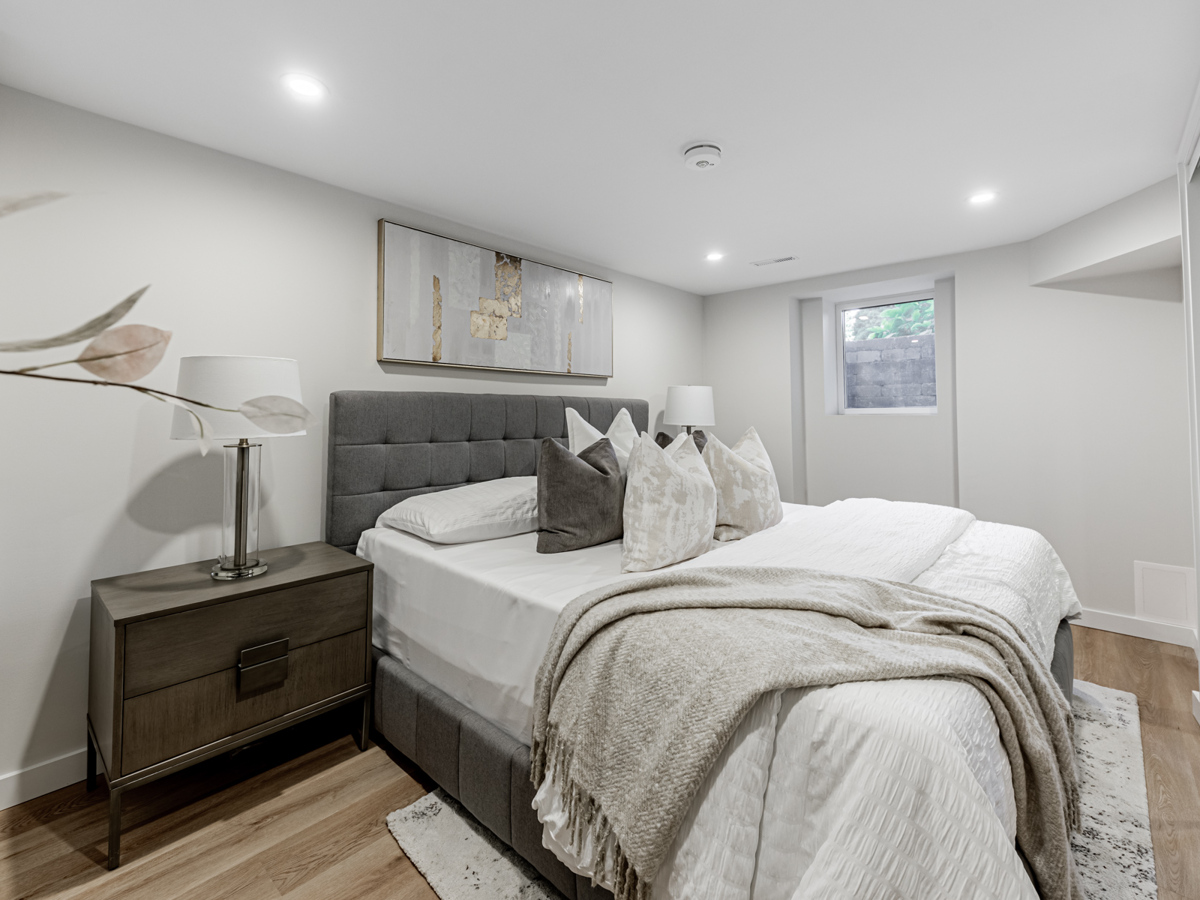How to Budget for a Basement Renovation
How to Budget for a Basement Renovation: 8 Simple Steps
.jpg)
Selecting the right flooring for your basement is one of the most important decisions when renovating or finishing the space. Unlike other parts of your home, basements are subject to unique challenges such as moisture, humidity, and potential flooding. The best type of flooring for a basement will not only enhance the room’s aesthetics but also ensure long-lasting durability and functionality.
Basements are often prone to dampness due to their location below ground level. This moisture can seep through the foundation, making it essential to choose flooring materials that resist water and prevent mold and mildew. Opting for water-resistant or waterproof flooring can safeguard your investment and maintain a clean, healthy environment in your basement.
Beyond moisture resistance, basement flooring must withstand wear and tear from high traffic, furniture movement, or even pet activity. Whether your basement serves as a family room, office, or home gym, the right flooring should balance durability with style. There are many options on the market that offer both functionality and visual appeal.
Table of Contents
Before choosing the best flooring for your basement, consider several key factors that will impact the performance and longevity of your investment.
Basements are naturally more humid, and moisture control is critical when selecting flooring. Waterproof or water-resistant flooring options are ideal for preventing damage from high moisture levels or accidental leaks.
Since basements can be cooler than the rest of the house, your flooring choice should also contribute to warmth and comfort. Some materials, like carpet or vinyl, provide better insulation, making your basement feel more inviting, especially during the colder months.
Your basement’s purpose will determine the level of durability you need. For high-traffic areas or spaces with heavy furniture, such as entertainment rooms or home gyms, you’ll need flooring that can withstand frequent use without wearing down.
Consider how much maintenance and cleaning your flooring will require. Basements used as playrooms or workshops may demand easy-to-clean surfaces, while basements serving as bedrooms or offices may allow for softer, cozier options that require a little more care.
Your budget will play a big role in determining the type of flooring you choose. Fortunately, there are affordable yet durable materials that suit various price points, allowing you to balance aesthetics with practicality without overspending.
Regarding basement flooring, several options stand out for their moisture resistance, durability, and overall performance. Here’s a breakdown of the best types of flooring for basements:
Vinyl flooring is one of the top choices for basement renovations. It’s available in both sheet and plank form, with luxury vinyl plank (LVP) being particularly popular for its resemblance to hardwood. Vinyl is completely waterproof, making it ideal for damp areas. Additionally, it’s durable, easy to clean, and affordable, with prices ranging from $2 to $5 per square foot for standard vinyl, and $4 to $7 for luxury vinyl.
Tile is another excellent choice for basements, especially in areas prone to moisture. Ceramic or porcelain tiles are water-resistant and incredibly durable, able to withstand heavy traffic without showing signs of wear. Tile flooring can be cold, but pairing it with a radiant heating system can provide extra comfort. The cost of tile flooring ranges from $3 to $10 per square foot depending on the quality of the tile and installation.
Laminate flooring is a cost-effective alternative to hardwood, offering a stylish finish at a lower price. While not fully waterproof, many laminate floors are water-resistant, making them suitable for finished basements with lower moisture levels. Laminate is easy to install, often as a DIY project, with an average cost of $2 to $5 per square foot.
For those who prioritize comfort, carpet is a warm, soft option that works well in finished basements used as living areas or bedrooms. While carpet can absorb moisture, modern carpets with moisture-resistant backings and low-pile options are more durable and easier to maintain. Carpet costs range from $3 to $6 per square foot.
While solid hardwood isn’t recommended for basements due to its susceptibility to moisture, engineered wood is a viable alternative. Engineered wood flooring consists of a plywood core with a hardwood veneer, offering the beauty of wood with enhanced moisture resistance. Engineered wood costs between $4 and $7 per square foot.
If you prefer a minimalist, industrial look, polished concrete is a durable and cost-effective option for basement floors. Concrete is waterproof and requires minimal maintenance, making it ideal for utility basements or workshops. You can also stain or seal the concrete for a more polished appearance. Polished concrete typically costs between $2 and $6 per square foot.
Each basement flooring option has its own strengths and potential drawbacks. Below is a quick comparison of the pros and cons of the top choices:
| Flooring Type | Pros | Cons |
|---|---|---|
| Vinyl | Waterproof, durable, affordable, easy to maintain | It may feel cold underfoot, less luxurious than other options |
| Tile | Water-resistant, extremely durable, low maintenance | Cold without radiant heating, more expensive installation |
| Laminate | Cost-effective, stylish, easy to install | Not fully waterproof, may not last as long in humid areas |
| Carpet | Warm, cozy, soft underfoot | Can absorb moisture, requires frequent cleaning |
| Engineered Wood | Stylish, moisture-resistant, adds value to home | More expensive, not fully waterproof |
| Concrete | Durable, budget-friendly, modern look | Hard underfoot, can feel cold without rugs or radiant heat |
The best flooring for your basement will depend on how you plan to use the space. Here’s a guide to help you choose the right material based on different uses:
For basements converted into family rooms, bedrooms, or playrooms, vinyl or engineered wood are ideal options. They offer durability and a warm, inviting aesthetic, while still being easy to clean and maintain. Carpet is another option for creating a cozy, comfortable environment, especially if moisture control isn’t a concern.
If your basement serves primarily as a utility or storage area, durability and moisture resistance should be your top priorities. Tile or concrete are excellent choices for these spaces, as they are water-resistant, easy to clean, and can withstand heavy items or equipment.
For basements being used as home gyms or offices, you’ll want durable yet comfortable flooring. Vinyl or rubber flooring are popular for home gyms because they’re slip-resistant and absorb impact. For a home office, laminate or engineered wood provides a professional and stylish finish.
If you have pets, opt for vinyl or tile flooring, which are scratch-resistant and easy to clean. These materials are also resistant to moisture, making them ideal for basements with pets.
Understanding the cost of each flooring option helps you plan your renovation budget. Below is a cost comparison of popular basement flooring options:
| Flooring Type | Cost Per Square Foot |
|---|---|
| Vinyl Flooring | $2 - $7 |
| Tile Flooring | $3 - $10 |
| Laminate Flooring | $2 - $5 |
| Carpet | $3 - $6 |
| Engineered Wood | $4 - $7 |
| Concrete | $2 - $6 |
Some basement flooring options, like vinyl planks or laminate, are suitable for DIY installation, which can save on labor costs. However, materials like tile or engineered wood often require professional installation to ensure a flawless finish, especially in areas prone to moisture.
Before installing any type of flooring, it’s essential to ensure the subfloor is dry and level. In basements, a moisture barrier may also be necessary to prevent water damage. Proper preparation can extend the life of your flooring and reduce maintenance needs.
The installation time and costs will vary based on the material and size of the space. For example, vinyl and laminate typically take a few days to install, while tile and engineered wood may take longer due to the need for precise measurements and sealing.
Once your basement flooring is installed, it’s important to maintain and protect it to ensure it lasts for years to come.
Install dehumidifiers to manage humidity levels in your basement and prevent moisture from damaging your flooring. Ensure your basement is properly waterproofed before installation to avoid future issues.
Each flooring type has specific cleaning requirements. Vinyl and tile can be easily wiped down with a damp mop, while carpet may require regular vacuuming and professional cleaning to prevent dirt buildup.
Use area rugs or mats in high-traffic areas to protect your flooring from scratches and stains. Regularly check for signs of wear and address any issues promptly to prevent further damage.
What is the best flooring option for a damp basement?
Vinyl flooring is the best option for damp basements due to its waterproof properties, followed by tile for high moisture resistance.
Can I install hardwood floors in my basement?
Solid hardwood isn’t recommended for basements, but engineered wood is a great alternative as it offers the look of hardwood with better moisture resistance.
What is the average cost to install basement flooring?
The average cost to install basement flooring varies, with vinyl and laminate being the most affordable at around $2 to $7 per square foot, while tile and engineered wood range from $4 to $10.
Which basement flooring is easiest to maintain?
Vinyl and tile are the easiest to maintain due to their water-resistant surfaces and low cleaning requirements.
Is it worth investing in waterproof basement flooring?
Yes, investing in waterproof basement flooring, such as vinyl or tile, can save you from costly repairs due to moisture damage in the long run.

How to Budget for a Basement Renovation: 8 Simple Steps

9 Things that could make or break your basement renovation dream (And how to avoid them) Basement renovations are one of the most rewarding home...

The thought of transforming your basement into a usable, beautiful space is exciting. You envision a home theatre, a playroom for the kids, or a...